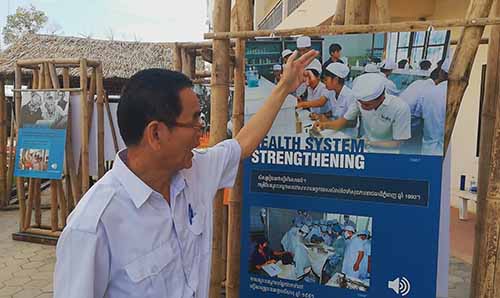Developing humanitarian medicine: from Alma-Ata to bio-tech, a history of norms, knowledge production and care (1978-2020)
The Humanitarian and Conflict Response Institute's (HCRI) Prof Taithe commences ambitious new five-year project to historicise humanitarian medicine as a set of emergency interventions.

Prof Bertrand Taithe is leading a group of researchers based at the HCRI at The University of Manchester on a new research project on the history of humanitarian medicine as a set of emergency interventions.
The project seeks to generate significant shifts in understanding its scientific and organisational specificity and role in developing clinical norms, debating ‘rights-based’ approach to health access and leading campaigns for access to drugs while deploying bespoke biotechnological tools.
This history will inform humanitarian practice and contribute to ongoing debates on how humanitarian medical providers engage with pharmaceutical and biotech industries to disseminate, repurpose, and research drugs and diagnostic tools.
The project will develop four work packages building up from patient-centred clinical norms and concerns on care to experimental initiatives in humanitarian setting and state-led norm-setting diplomacy through emergency medical teams (EMTs) initiatives.
The project will place historical records, their use and preservation, at the heart of humanitarian practices and transform the way that researchers and practitioners deploy evidence from the very recent past.
The project will draw from archives (existing NGO archives, public records, personal papers collected in the Humanitarian Archive at The University of Manchester John Rylands Research Institute and Library) and will create new archives through oral history and project field work.
The project started in September 2023 and has a duration of five years.
The project is funded by the Wellcome trust (226515/Z/22/Z).
View the website here
People
- Bertrand Taithe (Principal Investigator)
- Stephanie Rinaldi (Project Manager)
- Maria Cullen (Research Associate)
- Janelle Winters (Research Associate)
- Flora Chatt (Archivist)
The Humanitarian Archive
The Humanitarian Archive is the newest archive at The University of Manchester Library.
It was founded in 2021, which is when the first humanitarian collection arrived at the library.
We collect archives from small organisations and people who have worked in humanitarianism (or a related field), and we are particularly interested in archives that show how this field of work has changed and shifted, or which give us information on an area, a time period, an event, or a point of view that isn’t well documented in archives.
The Humanitarian Archive builds on and complements the Library’s existing collections, which encompass poverty and medicine in the Manchester area, pacificist movements and disability rights.
Read Flora Chatt’s introduction to The Humanitarian Archive.
